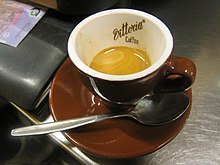Ristretto



Ristretto (Italian: [risˈtretto]),[1] known in full in Italian as caffè ristretto, is a "short shot" (20 ml (0.7 imp fl oz; 0.7 US fl oz) from a double basket) of a highly concentrated espresso coffee. It is made with the same amount of ground coffee, but extracted (also in from 20 to 30 seconds) using half as much water. A normal short shot might look like a ristretto, but in reality, would only be a weaker, more diluted, shot.[2] The opposite of a ristretto (Italian for 'shortened, narrow') is a lungo ('long'), which has double the amount of water. The French call a ristretto café serré.[3]
Regardless of whether one uses a hand pressed machine or an automatic, a regular double shot is generally considered to be around 14–18 g (0.49–0.63 oz) of ground coffee extracted into about 40 ml (2 fl oz; two shot glasses).[4] Thus, a "double ristretto" consumes the same amount of coffee beans but fills only a single shot glass.
Coffee contains over a thousand aromatic compounds.[5] A ristretto's chemical composition and taste differ from those of a full-length extraction for three reasons:
- More concentrated: the first part of any extraction is the most concentrated, its color typically lying between dark chocolate and umber, whereas the tail end of shots are much lighter, varying from the color of dark pumpkin pie to varying shades of tan (see photo, above right). This is an important factor when drinking straight espresso shots.
- Different balance: different chemical compounds in ground coffee dissolve into hot water at different rates. A ristretto contains a greater relative proportion of faster extracting compounds, proportionally fewer of the compounds characteristic of over-extraction, and thus, a different balance.
- Fewer total extracts: relative proportions aside, fewer total coffee compounds—caffeine being just one—are extracted into ristrettos versus full length shots. This is an important factor when diluting shots into water or milk.
Straight ristrettos—shots that are traditionally drunk from a demitasse and not diluted into a larger cup containing milk or water—could be described as bolder, fuller, with more body and less bitterness. These characteristics are usually attributed to espresso in general but are more pronounced in a ristretto. Diluted into a cup of water (e.g., americano or long black) or milk (e.g., latte or cappuccino), ristrettos are less bitter and exhibit a more intense espresso character.[6]
- A manual espresso machine
- A semi-automatic (electrically pumped) espresso machine
See also
[edit]References
[edit]- ^ "ristrétto". Vocabolario. Treccani.
- ^ "Glossary, R". Coffee Encyclopedia. Archived from the original on 27 November 2010 – via realcoffee.co.uk.
- ^ "Caffè corto, ristretto o lungo, quali sono le differenze?". Caffè Barbera.
- ^ "How Much to Grind for a Double Shot of Espresso?". SeattleCoffeeGear.com.
- ^ "Chemistry in every cup". rsc.org. Royal Society of Chemistry. May 2011.
- ^ Tien Nguyen (30 November 2011). "The Ristretto: The Lame Duck of Coffee". LA Weekly. Retrieved 28 February 2015.
The flavor is more intense, sweeter, less bitter since bitter components are introduced at the end of the shot....Overall, you end up with a much more pleasant and flavorful beverage.

